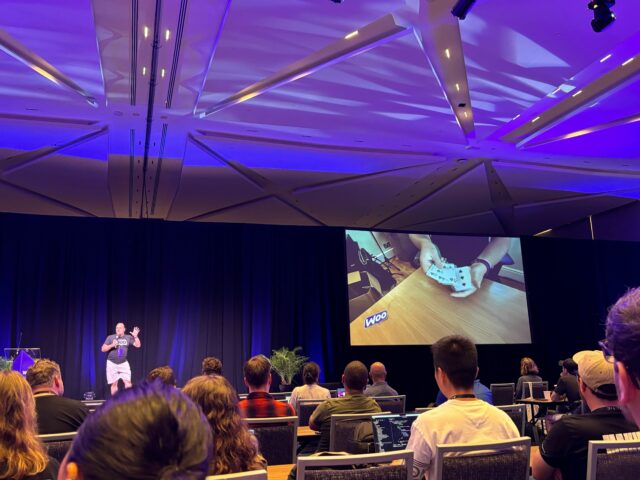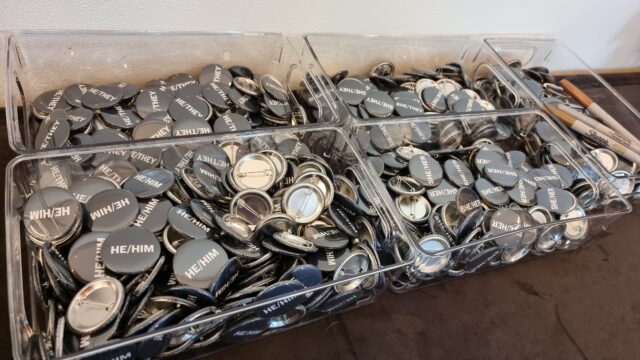Back at work after a three-month break, and it turns out the first thing that I’d missed is my team’s quirky morning ritual.
Tag: work
Sabbatical Lesson #1: Boundaries
Today was my first day back at work after three months of paid leave1. I’d meant to write about the overall experience of my sabbatical and the things I gained from it before I returned, but I’m glad I didn’t because one of the lessons only crystallised this morning.

My typical work schedule sees me wake up some time before 06:30 so I can check my notifications, formulate my to-do list for the day, and so on, before the kids get up. Then I can focus on getting them full of breakfast, dressed, and to school, and when I come back to my desk I’ve already got my day planned-out. It’s always felt like a good way to bookend my day, and it leans into my “early bird” propensities2.
Over the last few years, I’ve made a habit of pulling out my phone and checking for any new work Slack conversations while on the way back after dropping the kids at school. By this point it’s about 08:45 which is approximately the time of day that all of my immediate teammates – who span five timezones – have all checked-in. This, of course, required that I was signed in to work Slack on my personal phone, but I’d come to legitimise this bit of undisciplined work/life-balance interaction by virtue of the fact that, for example, walking the dog home from the school run was “downtime” anyway. What harm could it do to start doing “work” things ten minutes early?
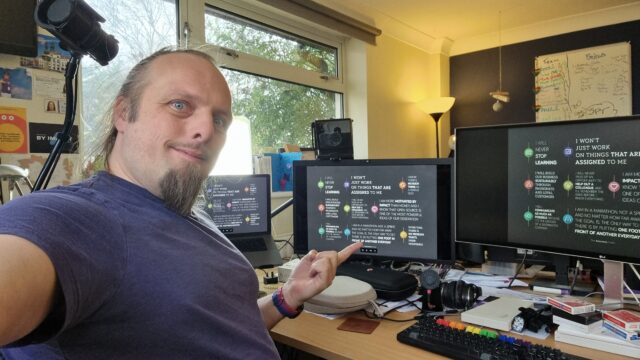
But walking the dog isn’t “downtime”. It’s personal time. When I’m looking at your phone and thinking about work I’m actively choosing not to be looking at the beautiful countryside that I’m fortunate enough to be able to enjoy each morning, and not to be thinking about… whatever I might like to be thinking about! By blurring my work/life-balance I’m curtailing my own freedom, and that’s bad for both my work and personal lives!
My colleague Kyle recently returned from six months of parental leave and shared some wisdom with me, which I’ll attempt to paraphrase here:
It takes some time at a new job before you learn all of the optimisations you might benefit from making to your life. This particular workflow. That particular notetaking strategy. By the time you’ve come up with the best answers for you, there’s too much inertia to overcome for you to meaningfully enact personal change.
Coming back from an extended period of leave provides the opportunity to “reboot” the way you work. You’re still informed by all of your previous experience, but you’re newly blessed with a clean slate within which to implement new frameworks.
He’s right. I’ve experienced this phenomenon when changing roles within an organisation, but there’s an even stronger opportunity, without parallel, to “reboot” your way of working when returning from a sabbatical. I’ve got several things I’d like to try on this second chapter at Automattic. But the first one is that I’m not connecting my personal phone to my work Slack account.
Footnotes
1 My employers’ sabbatical benefit is truly an epic perk.
2 Mysteriously, and without warning, at about the age of 30 I switched from being a “night owl” to being an “early bird”, becoming a fun piece of anecdotal evidence against the idea that a person’s preference is genetic or otherwise locked-in at or soon after birth. As I’ve put it since: “I’ve become one of those chirpy, energetic ‘morning people’ that I used to hate so much when I was younger.”.
Sabbatical Magic
A couple of weeks ago, I kicked off my first sabbatical since starting at Automattic a little over five years ago1.
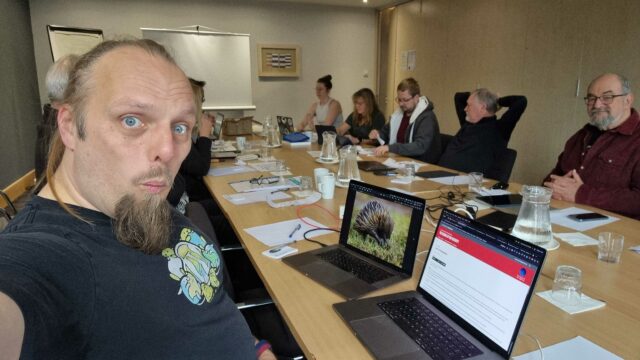
The first fortnight of my sabbatical has consisted of:
- Three Rings CIC’s AGM weekend and lots of planning for the future of the organisation and how we make it a better place to volunteer, and better value for our charity users,
- building a first draft of Three Rings’ new server architecture, which turns out to mostly work but still needs some energy thrown at it,
- a geohashing expedition with the dog, and
- a family holiday to Catalonia, Spain.
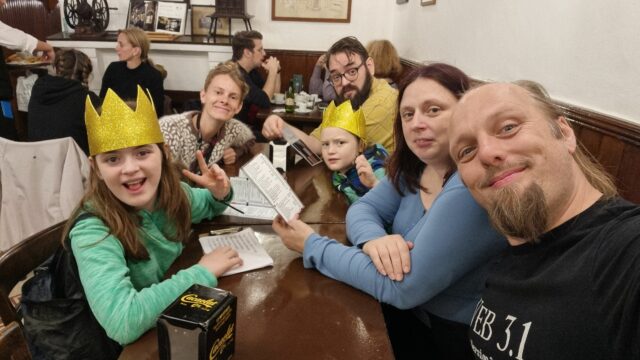
The trip to Spain followed a model for European family breaks that we first tried in Paris last year2, but was extended to give us a feel for more of the region than a simple city break would. Ultimately, we ended up in three separate locations:
- Barcelona, where we stayed in a wonderful skyscraper hotel with fantastic breakfasts and, after I was able to get enough sleep, explored the obvious touristy bits of the city (e.g. la Sagrada Família3 and other Gaudían architecture, the chocolate museum, the fort at Montjuic, and because it’s me, of course, a widely varied handful of geocaches).
- The PortAventura World theme park, whose accommodation was certainly a gear shift after the 5-star hotel we’d come from4 but whose rides kept us and the kids delighted for a couple of days (Shambhala was a particular hit with the eldest kid and me).
- A villa in el Vilosell – a village of only 190 people – at which the kids mostly played in the outdoor pool (despite the sometimes pouring rain) but we did get the chance to explore the local area a little. Also, of course, some geocaching: some local caches are 1-2 years old and yet had so few finds that I was able to be only the tenth or even just the third person to sign the logbooks!
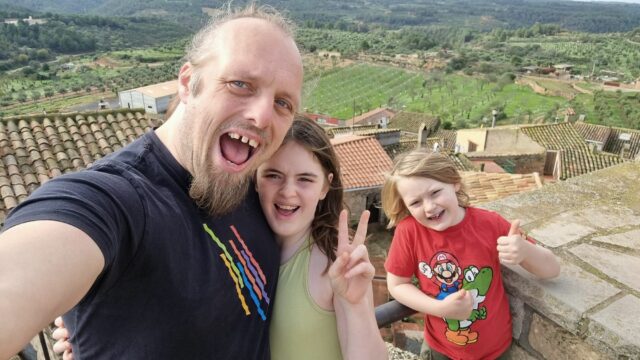
I’d known – planned – that my sabbatical would involve a little travel. But it wasn’t until we began to approach the end of this holiday that I noticed a difference that a holiday on sabbatical introduces, compared to any other holiday I’ve taken during my adult life…
Perhaps because of the roles I’ve been appointed to – or maybe as a result of my personality – I’ve typically found that my enjoyment of the last day or two of a week-long trip are marred somewhat by intrusive thoughts of the work week to follow.

If I’m back to my normal day job on Monday, then by Saturday I’m already thinking about what I’ll need to be working on (in my case, it’s usually whatever I left unfinished right before I left), contemplating logging-in to work to check my email or Slack, and so on5.
But this weekend, that wasn’t even an option. I’ve consciously and deliberately cut myself off from my usual channels of work communication, and I’ve been very disciplined about not turning any of them back on. And even if I did… my team aren’t expecting me to sign into work for about another 11 weeks anyway!

Monday and Tuesday are going to mostly be split between looking after the children, and voluntary work for Three Rings (gotta fix that new server architecture!). Probably. Wednesday? Who knows.
That’s my first taste of the magic of a sabbatical, I think. The observation that it’s possible to unplug from my work life and, y’know, not start thinking about it right away again.
Maybe I can use this as a vehicle to a more healthy work/life balance next year.
Footnotes
1 A sabbatical is a perk offered to Automatticians giving them three months off (with full pay and benefits) after each five years of work. Mine coincidentally came hot on the tail of my last meetup and soon after a whole lot of drama and a major shake-up, so it was a very welcome time to take a break… although of course it’s been impossible to completely detach from bits of the drama that have spilled out onto the open Web!
2 I didn’t get around to writing about Paris, but I did write about how the hotel we stayed at introduced our eldest, and by proxy re-introduced me, to Wonder Boy, ultimately leading to me building an arcade cabinet on which I finally, beat the game, 35 years after first playing it.
3 Whose construction has come on a lot since the last time I toured inside it.
4 Although alcohol helped with that.
5 I’m fully aware that this is a symptom of poor work/life balance, but I’ve got two decades of ingrained bad habits working against me now; don’t expect me to change overnight!
Hackaday
Zero
✅ Inbox Zero
✅ Slack Notification Zero
✅ Assigned PR Reviews Zero
✅ Owned PRs… one, but it’s approved and just waiting for the right moment to merge
That’s got the be the first time in… literally years… that I’ve ended a workday so “clean”. Feels amazing.
There’ll be a mess again tomorrow, but hopefully only of a manageable size because I’m particularly clean to finish this week at “Work Zero”.
Calm after the storm
This is a repost promoting content originally published elsewhere. See more things Dan's reposted.
Regarding the alignment offer at Automattic that resulted in around 1 of every 12/13-or-so Automatticians being paid to leave, my colleague Rosie writes of her experience of the week of the offer and our subsequent week in Mexico:
…
I never thought about taking the offer, but last week took a toll on all of us. It was a weird and sad week. So the Woo DM worked not only as it usually does, a week to bond with colleagues, have fun and collaborate in person. It was also one hundred times more energizing than it usually is. It had that little taste of “we are here because we believe in this. LFG!!!”. A togetherness that feels special. We could talk, discuss, and share our concerns, opinions, memories and new ideas for the future of Woo and WordPress.
…
That’s a good summary of the week, I feel. It was weird and sad, especially to begin with, but it grew into something that was energising and hopeful. There was, in particular, a certain solidarity, of us being the ones who stayed. It’s great to be reminded that my experience is shared.
Whether or not somebody chose to stay for the same reason as me, or as Rosie, it felt like a bonding experience to be among those who made that same decision. I’m glad we got to have this meetup (even though I’m feeling a bit run-down by a combination of exhaustion, jetlag, and – principally – some kind of stomach bug I’ve contracted somewhere along the way, ugh).
Meetup Magic
I’ve spent the last week1 in Tulum, on Mexico’s beautiful Yucatan Peninsula, for an Automattic meetup. And as usual for these kinds of work gatherings, it was magical (and, after many recent departures, a welcome opportunity to feel a closer connection to those of us that remain).
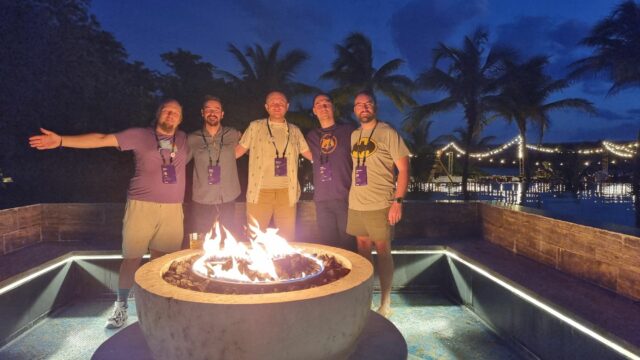
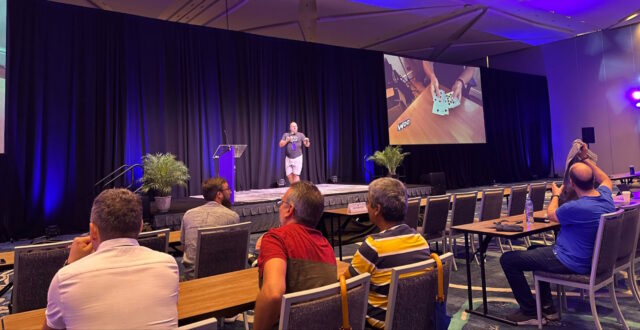
No, I mean that the whole thing felt magical. Like, I’ve discovered, every Automattic meetup I’ve been to has been. But this is perhaps especially true of the larger ones like Vienna last year (where my “flash talk” topic was Finger for WordPress; turns out I love the excuse to listen to other people’s nerdity and fly my own nerd flag a little).

Our events team, who are already some of the most thoughtful and considerate planners you might ever meet, had gone above and beyond in their choice of location. The all-inclusive resort they’d booked out for pretty-much our exclusive use was a little isolated and not the kind of place I’d have chosen for a personal holiday. But it provided all of the facilities my team, sibling teams, and division could desire for work, rest and play.
As usual, an Automattic meetup proved to be a series of long but energising days comprising a mixture of directly work-related events, social team-building and networking opportunities, chances for personal growth and to learn or practice skills, and a sweet sprinkling of fun and memorable activities.

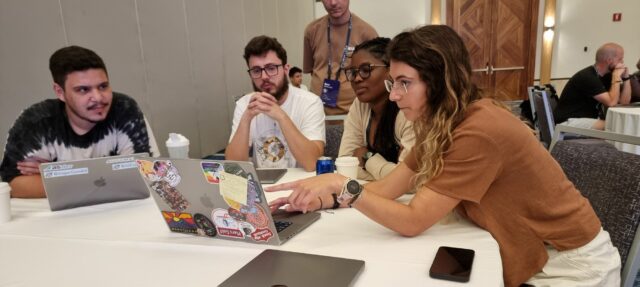
Our meetups might not feel like “work” (even when they clearly are!), but rather like… I don’t know… a holiday with 400 of the coolest, friendliest, most-interesting people you could ever meet6… which just happens to have an overarching theme of something that you love.
Recently-developed changes to strategic priorities, and the departure of a few of our colleagues during the recent aforementioned “realignment”, meant that my “superteam” – my team and its siblings – had a lot to talk about. How can we work better together? How can we best meet the needs of the company while also remaining true to its open-source ideology? What will our relationships with one another and with other parts of the organisation look like in the year to come?
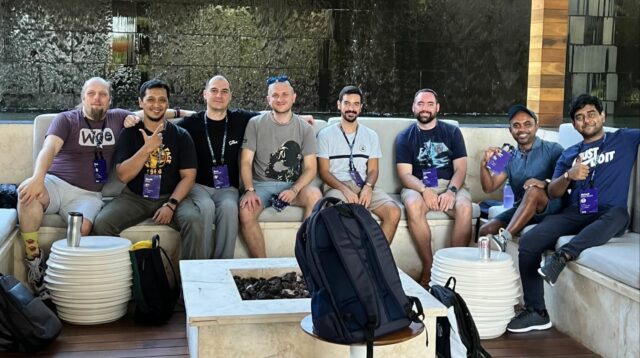
Every morning for a week I’d wake early and walk the soft warm sands and swim in the sea, before meeting with colleagues for breakfast. Then a day of networking and workshops, team-time activities, meetings, and personal development, which gave way to evenings with so much on offer that FOMO was inevitable7.
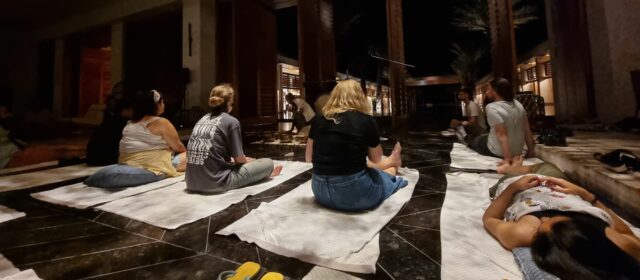
Our meetups are merely an intense distillation of what makes Automattic magical on a day-to-day basis.

Did I mention that we’re recruiting?
Footnotes
1 Travelling light, as has become my normal.
2 Excluding the two who couldn’t make it in person and the one who’s on parental leave.
3 Another example might be the pronoun pin badges that they made available in various locations, which I’ve written about already.
4 The spiders, which weave long thin strand webs that hang like tinsel from the cave roof, catch and eat mosquitoes, which I’m definitely in favour of.
5 Okay, fine: Harvey Mackey isn’t the original source, and it’s not clear who was.
6 Also, partially-tame trash pandas, which joined iguanas, agouti, sand pipers, and other wildlife around (and sometimes in) our accommodation.
7 I slightly feel like I missed-out by skipping the board gaming, and it sounds like the movie party and the karaoke events were a blast too, but I stand by my choices to drink and dance and perform magic and chat about technology and open source and Star Wars and blogging and music and travel and everything else that I found even the slightest opportunity to connect on with any of the amazing diverse and smart folks with whom I’m fortunate enough to work.
8 While I completely reject the magical thinking espoused by our “sound bath” facilitator, it was still a surprisingly relaxing and meditative experience. It was also a nice chill-out before going off to the higher-energy environment that came next at the poolside bar: drinking cocktails and dancing to the bangin’ tunes being played by our DJ, my colleague Rua.
Goodbye Tulum
Hurricane Milton
From safely outside of its predicted path, just around the Yucatan coast, Hurricane Milton seems like a forboding and distant monster. A growing threat whose path will thankfully take it away, not towards, me.
My heart goes out to the people on the other side of the Gulf of Mexico who find themselves along the route of this awakened beast.
Five Cards
It’s a bit hard to perform close-up magic to an audience 40 metres deep, so I pre-recorded my favourite card trick! Then I talked over it, explaining to colleagues from my division why it’s my favourite bit of slight-of-hand, and what great magic tricks have in common with great code.
I feel like I’m likely to have to perform a lot more illusions at the bar later today!
Tropical rain
It’s 05:30 local time on the third day of my work meetup in Tulum, on the Caribbean Coast of Mexico, and I was just woken by incredibly heavy rain. I got up and stepped out until it, and was surprised to discover that it’s almost as warm as the shower in my bathroom. In the distance, beyond the palm trees and over the hill, the booms of thunder are getting closer. Beautiful weather for a beautiful place.


